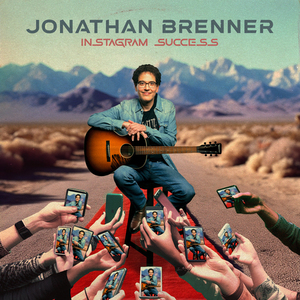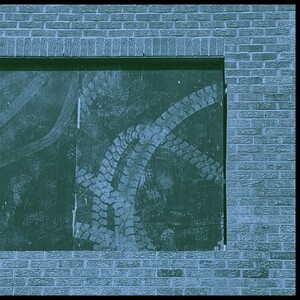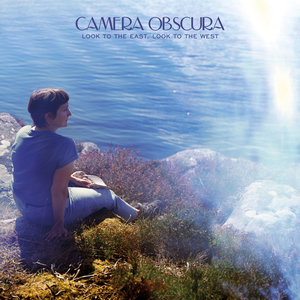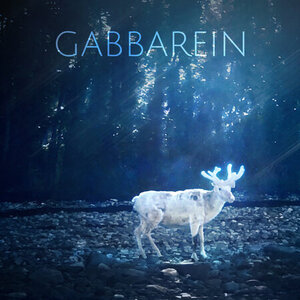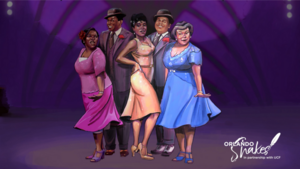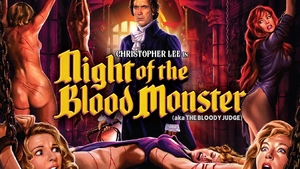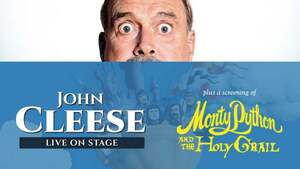Bailter Space
Space is the Place
Gail Worley
Welcome to the domain of hallucinatory soundscapes inhabited by a band called Bailter Space; please check all preconceived ideas of what legislates rock music at the door. Spawned from three schoolmates’ teenage band, the Gordons, (who recorded two albums in the early ’80s), Alistar Parker (singer/songwriter/guitar), John Halvorsen (bass), and Brent McLachlan (drums) reinvented themselves as Bailter Space around 1987, distinguishing them with the cumulative experience of playing together in a group for over 18 years. Truth is, these transplanted New Zealanders – now based in New York City – have been creating lush, ambient noise-rock for so long, it’s difficult to recall if they influenced the legendary feedback romps of the Jesus and Mary Chain or the other way around. Over the dozen compositions on Solar.3 , (the groups’ “seventh or eighth” record, Parker was unsure which) Bailter Space revisit Joy Division’s dark, emotional catharsis, Echo and the Bunnymen’s propulsive vibrancy, and the Psychedelic Furs’ jangly, narcotic pop. Parker, 37, is quick to point out, however, that they’re “not really looking to be influenced by other groups. We’re more influenced by our environment and surrounds,” he says, adding, “I do know of those bands, of course and I can see that you could draw lines from us to them.”
Solar.3 marks another major signpost on a long strange trip through the brainscape of an artist whose stranglehold on the power of harmonic distortion is complemented by a knack for creating lyrics so dense with cryptic beauty, light bends around them. As soundbites of disciplined, melodic noise-drone, the emotionally urgent “So Am I” and the almost-bluesy “Space X” (to cite two examples) unfold on cerebral journeys to destinations unknown, reaching some sort of satisfactory resolution in a span of minutes. “It’s not like a linear thing,” Parker says of the group’s musical progression. “It’s more that we’re taking various different inspirations from around us. Solar.3 has definitely got some strong melodic content, but as you turn the volume up on the stereo it goes back into the density of Vortura , another album of ours. We’ve combined a lot of our sounds on [this record].”
While Parker’s deep, compelling voice can get muddled in the mix, becoming the last gasp of the drowning man amid waves of reverberated guitar, wall of bass and driving beats, one can grab on to the handful of intelligible lyrics in whatever song he happens to be singing, leaving little need to penetrate too deeply for the message behind a song like “Live For You.” It is safe to let the music do the talking.
Being part of the original wave of “Alternative” bands, Bailter Space have borne witness to a sound they helped pioneer now invading the third or fourth wave of ambient techno groups. “It’s a really interesting thing and good for us,” Parker says, “because we’ve been very uncompromising and we’ve stayed with what we’re good at. If that [sound] has become suddenly popular, then we’ve got a lot of resources to draw from and we can really work with that.” Let us take a walk now, on a pleasant conversational outing with Alistar Parker. Let us see sanity, but not hold its hand.
••
You guys live in New York most of the year, how did that happen?
By 1990, we had an invitation from Matador to come to New York and do some recording for them, so we took them up on that. We’ve been based in New York ever since, which has been really great ‘cause it’s a great city and it’s close to Europe and the states for touring. We’re normally in New York for seven or eight months of the year. We seem to have a fairly established audience in about ten cities actually.
Yeah it’s a great hub. So what are you doing back in New Zealand now, besides the fact that it’s warmer there?
Yeah, really! [Laughs] We escaped the freezing-ness. We’ve been doing a series of shows in New Zealand, like a couple of tours. There’s only like four centers [venues] here, so we’re playing them all twice, going up and down the country and playing festivals, giving our New Zealand crowd a bit of noise. [Solar.3] was released here about three weeks ago. It’s been going pretty well and we’re getting pretty big crowds at our gigs.
Do you think Solar.3 , being a bit more accessible than your previous recordings, could bring some new attention from young fans or even attract attention to your back catalog?
I hope it does, that would be really great. We’ve made some really great records that have moved a lot of people around the world. We have fans who’ve been buying our records for years. It’s not like they play it out, there’s always some kind of new dimension you’ll find in the sounds that we’re creating, I think.
Do your stage shows incorporate enhanced visuals at all?
We have a lighting engineer in New Zealand. It’s a really great thing because [when we’re in New Zealand] we can get our lighting guy to come and engineer a show for us. We’re normally in the position that we can’t really afford the expense of a light show, but we do have a plan and if we’re able to put on a show like that [then] we’d definitely incorporate it.
Do you have a day job?
“bailter_space”
Occasionally, we’ve had a day job or two, just to tie us through to the next recording commitment or tour or whatever. Basically, we’ve been living on this band. It’s been really great. [Making a living through the music] has been possible for us. We’re hoping that we might be able to bump it up a couple of notches and get to the stage where we can put on a really big installation of equipment and lights, which we’re really good at doing. The opportunity to be able to do that in the states [would be great].
Your music would be so complemented by really intense accompanying visuals and maybe lots of drugs. Like a really big rave…
Yeah, it’s got a really big sound to it…that’d be great. We have really good engineers…it’s a matter of being able to afford to fly them in to the States, and us as well, you know.
Yeah, I understand. Your music seems pretty organic in nature and I wondered if you have any interest in selling your soul to the remix devil or maybe incorporating some sampling?
I’d like to experiment with some remixes at some stage, yeah, just to see where it would go. I think it would be very interesting to experiment with but we’re working a lot on the actual sounds that we get from analog or acoustic-style instruments, really. That’s maintained its importance to us… to get these kinds of tonal sounds from more acoustic-style instruments like guitar and drums. It’s incredibly dynamic [to see what you can do with that].
Your lyrics are rather difficult to penetrate, but the mood of the songs still comes through, by whatever means you decide to employ in your vocals or in the way the sounds just come together. They’re not exactly sing-along songs though.
We haven’t got to the sing-along stage.
What kind of mood are you in when you write…what influences you specifically?
[I rely on] Visualizations of a kind…and we’ve also sung against the overshadowing, oppressive corporate power. We’re singing for the idea of individuality, that kind of thing.
The song “Big Cat” sounds like a break-up song to me.
Well, it depends on how you interpret it. One interpretation would be that it’s just time to leave the city, so you steal someone’s car and get outta there. It’s like, you’ve decided that the world that’s been imposed upon you is actually rather fickle and worthless, so you decide to throw it back in their face, you know?
Did you base that song on an experience you had?
It’s kind of a vibe thing. It’s like speeding out of a metropolis and going to another one…starting over again with your friends that are really important and escaping the claw of the industry…[laughs] know what I mean?
I can see that whole scenario in my mind…I think it would make a great video.
Right, yeah. We worked with some pretty good directors for the Wammo album, and did a great video for “Splatt.” We need to find someone out in New York who’s willing to work with us in a really innovative way.
Are there songs on Solar.3 that are your favorites, or that are more personal to you than others?
[long pause] Well, at different times…some of them… the words can be interpreted a lot of ways, so they hook into a lot of different kinds of things. At other times, the words are like, [on] “Tide”… I could make that quite personal ‘cause it’s about seeing someone that you adore sail away in whatever form that [is] and reflecting on your own environment. Then, getting over the natural process of grief… so I could apply that to my own life, [pause] in areas, definitely. It depends on your take…there are some scenarios that I’ve been involved with in real life [laughs] and then I work that into a sort of picture or form of something that occurs, or words happen or a certain feeling of a character [comes to me] and I write a poem associated with that theme. I can draw a line to my life but it’s not like the exact representation of things that are real. It’s more like a feeling or visualization of a thing, people, ideas, energy…
That’s what I was getting at when I said the mood of the song comes across even if you can’t grasp every word you’re saying.
I find that a lot of fans around the word will pick up words quite different to what I’m singing and really get something out of it. I like the way [our songs] can be open to interpretation by the listener, that the listener can get really involved creatively while they’re listening. That’s really important to us.
Do you find your music is rather dark and melancholy?
Sometimes we go over to a darker side and incorporate that, and sometimes we use that for just pure contrast…like the dark and the light… creativity and destruction.
Since you are so inclined towards visualization when you compose your music, are you visually inclined in other ways? Do you paint or draw?
Yeah, John [Halvorsen, bass] and I both paint… have painted at times. We haven’t done anything for a little while but we both have done that and exhibited our work here in New Zealand. And I’ve been a photographer, a commercial photographer, [so] I got to study the play of light. My eyes have become trained to see the play of light…that’s a really enjoyable thing. It’s a great thing to have learned.
Sounds very complementary to your musical creative process.
It’s sort of like breaking layers down, seeing what you cannot normally see. Some of the feelings I get when we’re working together as a group, writing songs, are to remove layers and see things that are more hidden [laughs softly]. ◼

